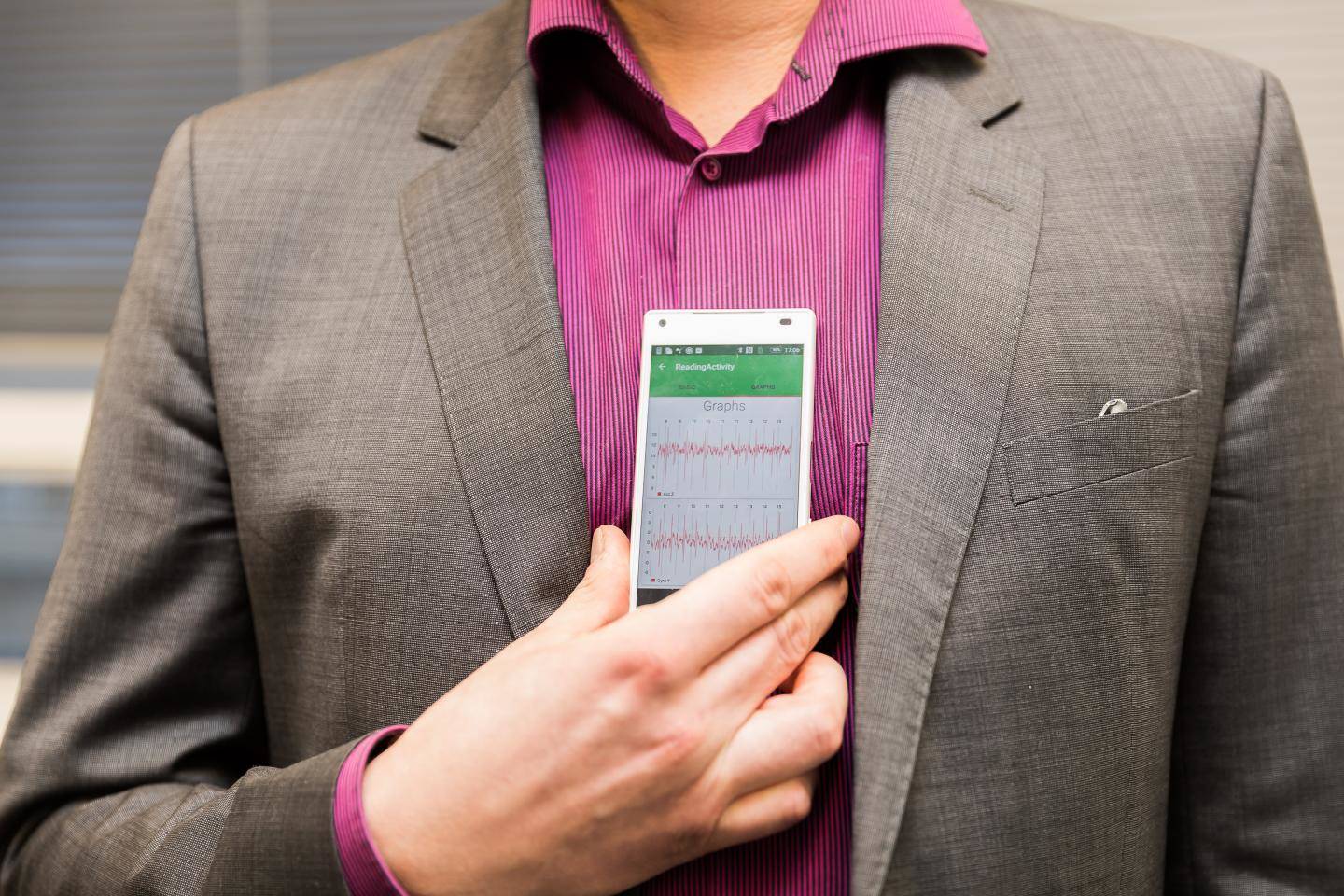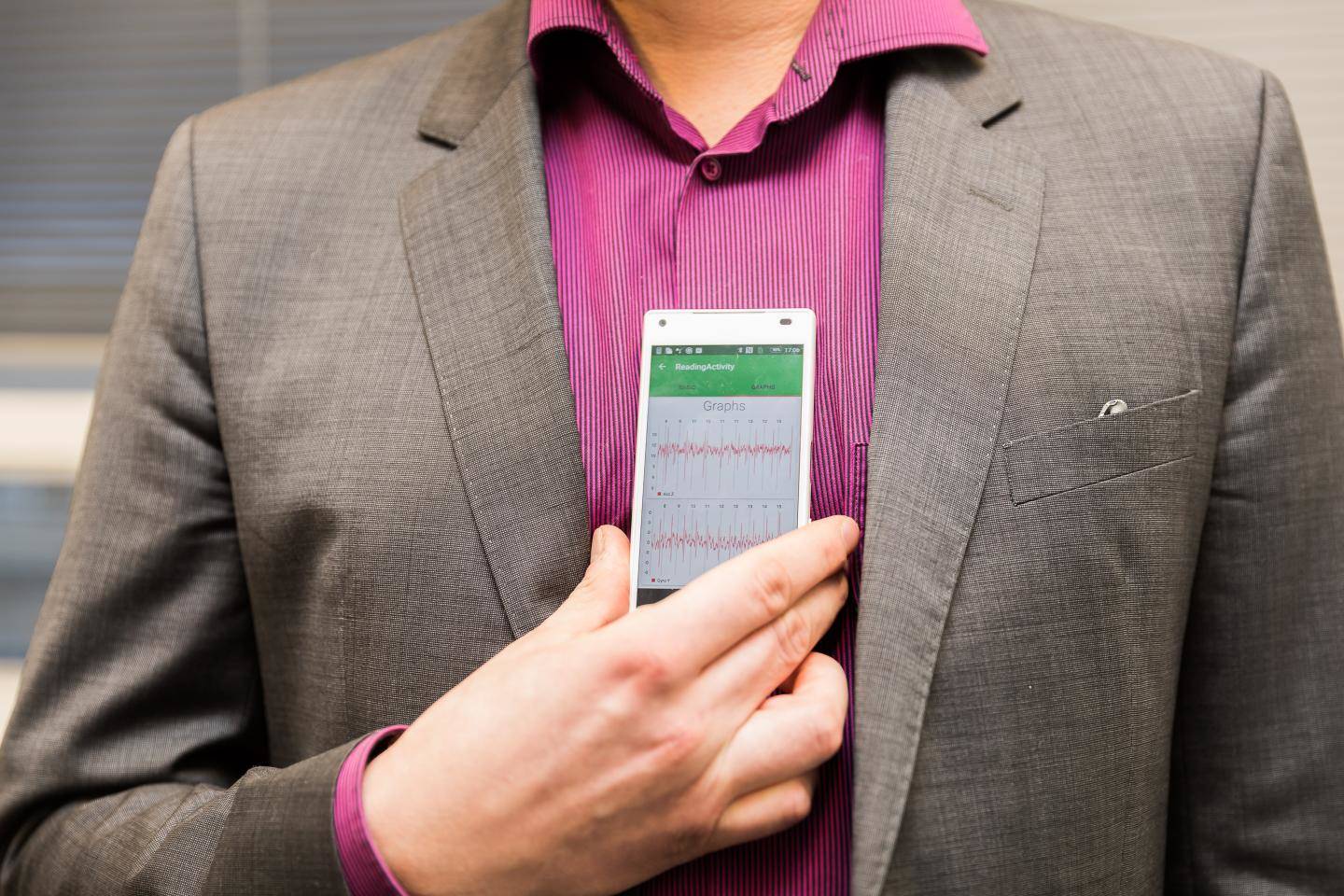
Credit: Hanna Oksanen / University of Turku
A new application developed at the University of Turku, Finland, can detect atrial fibrillation that causes strokes. Atrial fibrillation can be detected with the mobile phone application without any extra equipment. The mobile application can save lives all over the world as timely diagnosis of atrial fibrillation is crucial for effective stroke prevention.
The joint research project of the University of Turku and the Heart Centre of the Turku University Hospital studied three hundred patients with heart problems, half of whom had atrial fibrillation. The researchers managed to identify the patients with atrial fibrillation from the other group with a smart phone.
The mobile application that was developed at the Department of Future Technologies of the University of Turku detected which patients had atrial fibrillation even with a 96-percent accuracy. In other words, the application recognised automatically near all cases with atrial fibrillation and the number of false alarms was very low.
– The results are also significant in that the group included different kinds of patients, some of whom had heart failure, coronary disease, and ventricular extrasystole at the same time. The research was conducted as a blind study, which means that the hospital sent us measurement data for analysis without any additional information, says Project Manager Tero Koivisto from the Department of Future Technologies.
The completed analyses were sent back to the hospital where their reliability was checked. This way, additional optimisation during the study on the basis of the data was not possible.
– At first, I was rather anxious about how well the algorithm will do in the blind study, especially because I felt that the patient group was particularly challenging. You could say that I was surprised myself how well it worked in the end, says Mr Koivisto.
Atrial Fibrillation Is Not Always Detected Even at the Doctor's Office
The application has been under development for quite some time — it took seven years of careful research to achieve it. Detecting atrial fibrillation has been a worldwide medical challenge for years, but affordable solutions available for all have been lacking.
When technology researchers at the University of Turku were designing new solutions together with cardiologists of Turku University Hospital back in 2011, they decided to try whether it is possible to reliably detect atrial fibrillation from the micromovements in the chest with small accelerometers . They got the answer in 2017 when the study was completed: yes, it is possible.
– Most smart phones have an accelerometer. As nearly everyone has a smart phone, we decided to develop a simple application that could be used in the detection. In the future, everyone who owns a smart phone can detect atrial fibrillation, says Mr Koivisto.
According to Chief Physician and Professor of Cardiology Juhani Airaksinen from Turku University Hospital, this is the first time that ordinary consumer electronics have achieved such reliable results that they can be actually beneficial for the patient's medical care. The results are also remarkable in that intermittent atrial fibrillation is not always detected even at the doctor's office.
– If everyone can measure with an ordinary smart phone whether they have atrial fibrillation, we have the possibility to direct patients straight to the doctor and further testing without any delay. Therefore, the potential for economic savings is significant, says Professor Airaksinen.
Commercialisation of the Application Is Advancing Quickly
The researchers want to make the application available for all as quickly as possible and they believe that it will also spread to the international market. According to Mr Koivisto, the commercialisation of the method is advancing quickly.
– We have applied patent protection for the new methods already at the early stages of the study, and in the course of this project we have gathered a significant patent portfolio. At the moment, the portfolio is owned by the University's spin-off company Precordior Ltd.
The CEO of Precordior Ltd Tuomas Valtonen tells that, at the moment, the company is negotiating with investors from Silicon Valley and East Asia. – The interest towards this new technology has surprised us at times, and we strongly believe in the potential of Finnish expertise also in the global arena. This is a good place from which to move forward.
The results of the study was published in the Circulation journal.
###
Media Contact
Project Manager Tero Koivisto
[email protected]
358-443-513-027
http://www.utu.fi/en/
Original Source
http://www.utu.fi/en/news/news/Pages/Mobile-Application-Detecting-Atrial-Fibrillation-Reduces-the-Risk-of-Stroke.aspx http://dx.doi.org/10.1161/CIRCULATIONAHA.117.032804





